EDITOR’S NOTE:
On Thanksgiving morning, 2017, I received an unexpected email from someone whose name sounded vaguely familiar but that I couldn’t place.
The email read as follows:
You likely do not know me. About seven years ago I was sitting in a cell and opened up a manila envelope with a story enclosed in it. It was a piece written by my high school teacher Dennis Danziger. He told me he wrote a piece on me. I didn’t know why. I just knew that the guy cared about me and wanted to help.
I want to say thank you for allowing the story to be published. Somewhere on a computer screen there was a Jewish guy reading that story. That guy happened to be a movie producer with a lot of clout in the criminal justice system. He wasn’t well known at the time, but his work and help reached many. Scott Budnick decided he wanted to visit me. He did and offered to get me to a prison where a college program, along with an abundance of self-help groups, was available. I transferred there and immersed myself in education. Things began to change–my personality, the way I viewed things, everything. I earned my GED and later received an AA degree.
I’m writing to you late at night because I ran across your name and remembered that you were the one that gave Dennis the opportunity to publish his story. I was given a 22-year prison sentence and was recently released 10 years earlier than expected. The governor commuted my sentence. You probably don’t know, but I likely wouldn’t be writing to you right now if it weren’t for that piece being published. I would have never gone to Ironwood where my life took a turn for the better. I would have never met Scott. I would have likely not obtained a degree and been fully involved with helping the youth that entered the prison system. I would have never gotten recognized by the governor’s chief of staff. I wouldn’t be home.
I say thank you for giving a hand of kindness and not knowing what might come of it. Normally the bad takes the spotlight and is constantly thrown in our faces. The bad decisions we make continuously replay in our heads. But I hope you know that a decision you made drastically affected my life for the good. Thank you, Celeste. I mean that from my heart.
Hope I wasn’t much of an interruption.
Kindly,
John Rodriguez
As I read, memories quickly returned about a story WitnessLA had run nearly eight years ago having to do with a high school student named John Rodriguez. It wasn’t one story, actually, but a series of four stories written by Dennis Danziger, a local high school composition teacher who is also an author. I asked Danziger to write the series after he told me a painful tale about a talented kid in his class who, seemingly out of nowhere, had committed an awful crime.
When Chapter Four of the story ended, all we knew was that a gifted 17-year-old was headed to prison for 22 years. Yet, the details of how this had occurred were still unsettlingly fuzzy.
And now there was this email suggesting that the stories had somehow triggered a series of events that had the unlikely effect of getting John Rodriquez on the radar of Governor Jerry Brown’s staff.
But how in the world had all this come about? How had he gone from being the star of his high school English class to serving a 22-year prison term? And what exactly had happened while he was locked up that resulted in the governor commuting his sentence?
I wrote John back and asked if he’d be willing to be interviewed. Then I began contacting a list of people whom I hoped could help fill in the rest of John Rodriguez’ story.
This is what I learned:
THE WRITER: The Sequel
John Rodriguez was seventeen when he shot a 25-year-old man outside a bar in Cudahy, California. Rodriguez, who is now 26, says he was not able to sort out the thoughts and emotions that caused him to point a gun at another human being and pull the trigger until he’d been in prison for at least two years, probably longer.
Rodriguez admitted when we spoke recently that he is still uncomfortable talking about what happened on April 5, 2009. Yet he makes a point of pushing himself to talk anyway. “It’s very messed up to think, like, man, that’s what really happened,” he said. “But I remember every one of those moments. “
On the night of the shooting, according to Rodriguez, he and his older brother had gone out drinking because the brother had joined the Navy and was about to ship out.
“We wanted to hang out one last time before he left,” he said. So they chose a large, noisy, music-filled place called the El Potrero Club.
The brothers were nearing the end of the evening when, in the kind of moment that has become a bar fight movie cliché, a far larger man bumped into Rodriguez’ brother. The brother and the big guy, who was in his mid-20s to the brother’s 19, got into an argument. The argument escalated. The other guy, according to Rodriguez, was drunker than the two brothers, who were themselves pretty inebriated, despite both of their underage statuses.
Hoping to avoid a physical confrontation, Rodriguez grabbed his brother and herded him out of the club.
But the big guy and his friends soon followed them out the door and into the sizable parking lot. “I saw that these other guys continued to go down the way we went.”
As the brothers proceeded toward their car, they continued to be unable to shake their tail.
After one more glance back at the followers, Rodriguez remembered being seized by an irrational fury toward the big man, whose name he would later learn was Enrique Evangelista.
“I know now that the anger wasn’t towards him…that it was something else.”
The fury might have passed harmlessly if it were not for the fact that Rodriquez and his brother had a gun in the car with them.
According to Rodriguez’ Venice High School English teacher, Dennis Danziger who, during the school year, had become an unofficial mentor to the teenager, whom he saw as an unusually talented writer, it was the teenager’s mother who encouraged her sons not to go anywhere even slightly risky without packing a weapon.
It would prove to be a tragic piece of advice.
The legacy of family
John Rodriguez’ mother was 16-years-old when he was born. Rodriguez was her second child. His elder brother, who would later aspire to become a Navy man, had been born two years earlier when the mom was 14-years-old.
Children having children.
When Rodriguez was five, his mother became pregnant with a third child, John’s sister. But before the girl could be born, the children’s father, a gardener, and the most stable member of the family, died suddenly.
“From when I was born, until the time I was five, we had what I would call a normal family life,” Rodriguez said. “We lived in a house. My dad went to work. And when he came back at night, he looked after us. But when he passed away, everything just kind of went to shit. My uncle, who was my mother’s brother, and who lived with us, got killed right after my dad died.”
The uncle was a gang member, John said, and “enemies” killed him execution style.
Rodriguez’ family, it seems, was loaded with gang members on his mom’s side, a legacy that would add large doses of confusion to the boy’s own life, particularly as he entered his teenage years.
After the double blow of his father’s death and the murder of his uncle, things in the family destabilized. The young mother and her three young children had nowhere to live, so they jumped from friends’ house to friends’ house, staying with whoever could and would offer a spare room.
Finally, Rodriguez mom was able to land a job, which allowed her and her three kids to move into an apartment of their own But the stability was only partial. “When my mom would be at work, we three kids would take care of each other, cook for each other, clean…..pretty much everything,” he said.
During this period, his mother also used to go out a lot. “She was kind of trying to make up for the teenage years that she lost. So she partied a lot. Really a lot.”
It was Rodriguez brother who all but raised the two younger children, according to Danziger. “John never felt very connected to his mother.”
Rodriquez was a bright child and, during rocky periods at home, school became a steadying force that the boy valued. He did well when it came to classwork, in part hoping to please his mother. Yet, according to Rodriguez, the mother seemed not to care, until on one occasion in 5th grade he came home with a bad grade. “And she got really upset.”
Rodriguez quickly made up for the slump in his schoolwork, and soon earned his first Student of the Month award. He asked his mom to attend the ceremony. But no one showed up.
When Rodriquez entered his teenage years, like many disaffected kids in his neighborhood, he drifted toward the gangs that had long been part of the family legacy.
By that time, Rodriguez’ relationship with his mother had broken down almost completely, although he acknowledges that his mom worked hard to earn a living for her family, which now included a new man in her life and two more children.
“We rarely talked,” he said. So he started looking for warmth, reassurance, and attention elsewhere.
“Everything that I used to seek from her—you know, that love and support a child wants—I found from these other people.” In other words, the neighborhood gangsters.
Although Rodriguez said he was put off by the drugs and violence that came with gang life, he was drawn by the feeling of belonging. “These are people that have the same background, the same upbringing as you. What’s going on in your house is going on in their house too. And so you build this thing where you think, ‘we don’t need our family, we don’t need this or that, we have our selves, and we’re okay.’ But it wasn’t really true, of course.”
Matters were not helped by the fact that the adolescent Rodriguez lacked self-confidence. “I didn’t know how to stand my ground. And so I followed.”
He still liked school. But he was leading what he called a second life, namely the gang life, which caused him to assume he had little in common with those whom he viewed as good students at Venice High School.
He began cutting class and his grades slid drastically. “By the 10th and 11th grade,” he said, “I was pretty much getting just Ds and Fs.”
Rodriguez got a lucky break when, as a senior at Venice High School, he was transferred into Dennis Danziger’s English class. Danziger, a gifted writing teacher who was also an author himself, and married to Amy Friedman, another writer, had a knack for bringing out previously unseen talents in his students.
At first, however, Rodriguez didn’t know what to think about his new instructor.
“I felt there was no organization going on in the class,” he said. “There was no image of power there. No authority.” After a while, Rodriguez said he learned that Danziger’s authority did, in fact, exist. “It was just hidden. He used authority in such a laid-back fashion that you wouldn’t even see it.”This different approach to teaching had an effect on Rodriguez. “Suddenly I wanted to, like, get my shit together. I started finding out I did enjoy school. I started going to pep rallies and hanging around different kinds of people. Suddenly, I actually liked the school life that, for me for so many years, had not seemed normal.”
But he was still leading his other life too, the gang life.
“Ultimately that life led me to hurt and to want to kill somebody.”
Not gangster enough
Another feature of Rodriguez’ teenage psyche was the persistent worry that he would let his family down because he wasn’t tough enough.
“I remember, my mother used to look at me as the weak one, like I was the guy who didn’t have it in him to hurt somebody. After we lost our uncle, she used to tell us, it was better for other people to cry in their house, than for anybody to cry in our house. ‘So, you’re going to do the hurting and you’re not going let nobody hurt you,’ she told us. She engraved that in our heads.”
He also felt it was his job to look after his brother—even though he was the younger of the two–since his brother had spent so many years looking after him.
His mother reinforced the view. “She said, ‘He’s your family. No matter what you’re going to protect him.’”
This brings us back to the parking lot of the El Potrero Club where the bar drunk and his friend were following Rodriguez and his brother, as they walked toward their car.
Rightly or wrongly, Rodriguez saw the body language of the followers as threatening.
The seventeen-year-old was also convinced that he didn’t personally look scary, which at that moment in the club parking lot, seemed important. He wasn’t physically large. “And I didn’t have the gangster Cholo look,” he said. “So when I went to the car, and I saw them still following, I felt I wanted to prove a point in this guy. I wanted him to know you don’t mess with people just because they look like they’re completely harmless.”
Rodriguez said he decided to show the 25-year-old, Enrique Evangelista, “Hey, I can hurt you too.”
And so he pulled a gun from the car and did just that.
“I shot him. I tried to kill him.”
Rodriguez fired several times and the two brothers watched as at least one of the bullets connected.
Stunned at what John had just done, the brothers panicked. They jumped into the car and screeched from the club parking lot. John Rodriguez tossed the gun out the car window as they drove.
They didn’t get far. “We got pulled over by cops pretty quickly, and we got arrested.”
Rodriguez’ victim, it turned out, was lucky. He was shot in the shoulder, but the wound was not life-threatening. According to Rodriguez, Evangelista was released from the hospital that same night.
But, of course, had the trajectory of the shoulder shot been slightly different, Evangelista could easily have been killed.
Irrationally, Rodriguez didn’t realize the seriousness of his situation when the police questioned him on that first night. “It’s crazy, but for some reason, I still had this thought, that, like, maybe my mom can still come pick me up.”
It wasn’t until his first arraignment that John began to realize the actions that could easily have taken the life of the man he shot, might now cost him the rest of his own life.
(WitnessLA tried repeatedly to locate Enrique Evangelista, but we were unsuccessful in locating him.)
Deals and more deals
Despite any family squabbles, after Rodriguez was arrested, John’s mother, who worked as a waitress, gathered every bit of money she could from savings, friends, and family, and hired a private attorney for her son. What she did not know is that the attorney, David Currie, was prohibited from practicing law for much of the time he represented Rodriguez, because the California State Bar Association had suspended his license.
Currie was subsequently disbarred in 2013, and “prohibited from practicing law in California by order of the California Supreme Court.”
But, future disbarments aside, according those we spoke with who observed most or part of Rodriguez’ unfolding case—including Danziger, and Elie Miller, who is a former alternate public defender, on the faculty at Loyola Law School, and the former legal director for Homeboy Industries—Currie seemed to be phoning it in for his young client. He failed to mount any kind of challenge to the prosecutors’ push for Rodriguez to be tried as an adult, and did not attempt to get the brothers’ cases severed—both crucial mistakes, according to Miller.
The prosecutors were pushing for a conviction that would result in, not one, but two life sentences for the 17-year-old, since Evangelista was standing near to an inhabited car when Rodriguez fired at him, thus opening the door for a second life term.
With a defense attorney who offered little resistance, the best deal the prosecution would offer the teenager was a single life sentence rather than two. With nothing to lose, Rodriguez said he wanted to go to trial instead. Finally, the prosecution offered what they said was their last deal.
“It was 25-to-life for both me and my brother.” If they added a gang allegation to the charges, the prosecution could legally tie the brother to the shooting, although he was not the shooter. The Rodriguez brothers again said they preferred to take their chances at trial.
A week before trial was to begin, Rodriquez’ mother fired Currie. She had managed to raise a little more money and was able to hire a new attorney. In short order, the second attorney succeeded in getting a deal that Rodriguez felt he could live with.
“It was 22 years for me and five years for my brother.” Rodriguez could try for parole after 18 years, but was told he would likely do the maximum. Or more.
“But my brother would do 4 1/2 years out of the five.”
Rodriguez big brother was alarmed at the lengthy sentence for his baby brother and said they should still go to trial.
“But I told him, ‘No. This is something that I did, and this [sentence] is something that I will have to do.’”
Beginning a twenty-two-year sentence
After the inmate reception and classification process, which every California Department of Corrections (CDCR) inmate goes through, and which can take up to 120 days, Rodriguez was transferred to a Level IV yard in a California state prison in Sacramento. The prison is colloquially known as New Folsom, and it would be the new inmate’s home for the foreseeable future.
Once Rodriguez had settled in at New Folsom, Danziger began writing him letters, hoping to at least nurture the young man’s intellectual talent, if he couldn’t help his legal situation, which he had come to realize was a done deal. But while Rodriguez had enjoyed Danziger’s class on the outside, post-conviction, his shame acted as a nearly unbreachable barrier that caused him to reject most of the overtures his former teacher attempted to offer.
“I don’t take compliments very well,” said Rodriguez when he tried to explain his reaction during those first years at New Folsom. “And I’ll push people away because of it. I’d discovered in the past that usually when people compliment me, they want something in return. So I was kind of testing him again.”
About eighteen months into the young man’s sentence, Danziger tried visiting Rodriguez.
The experience shook the instructor.
“The first time I visited him, I didn’t recognize him,” Danziger said. “He was so thin. His hair was long, and he said he’d been discovering his Native American roots, which seemed like a good thing.” But Rodriguez was discomfortingly withdrawn, so much so that Danziger actually devised questions to make sure his former student, was really his former student.
“Even after I realized it was really him, he wouldn’t take so much as a sandwich from the vending machine from me. He wouldn’t take a bottle of water. Nothing. It was like something had been beaten out of him.”
Yet, despite Rodriguez’ mistrust, when Danziger wrote him and gave him writing “prompts,” a.k.a. topics to stimulate a story or an essay, with rare exceptions, Danziger’s inmate protege would respond with a piece of writing.
And the writing was good. So good, in fact, that Danziger often shared Rodriguez’ work with his high school students.
The feedback that the students submitted to their teacher after reading Rodriguez’ essays was another factor that helped to chip away at the young man’s defenses.
“Dennis used to actually send me the feedback in manila envelopes, and I used to read all this stuff from these kids. Finally, I thought, ‘Oh, crap! People can actually relate to these things I’m writing.‘”
Rodriguez says it took close to two years for his internal walls to truly crumble. “Finally, I said, ‘OK. He wants to write me letters because he simply wants to write me letters. There’s nothing in it for him.’ I saw he was genuine.”
The combination of Rodriguez’ own writing, triggered by Danziger’s prompts, along with the ongoing epistolary conversation between teacher and student, began to act as an emotional tonic.
“Finally I just completely let everything down with Dennis. All my walls, all my barriers. I was just a simple person. I was just me on paper when I wrote it to him.”
Shortly after his internal drawbridge lowered in earnest with his former teacher, Rodriguez got a second visitor.
This time, however, the visitor was some person named Budnick whom the inmate had never met.
Rodriguez gets a visitor from Hollywood
Scott Budnick is a former entertainment business guy who, at the time, was best known as the executive producer of the funny, raunchy, and stratospherically high-grossing Hangover trilogy.
(It’s important to note that, despite the money-printing nature of the franchise, due to his deal with the production company of which he was a part, Budnick mostly made several fortunes for other people.)
In 2013, shortly after his first visit to meet with Rodriguez, Budnick would leave his Hollywood career to spend all his waking hours as one of the state’s most effective prison and juvenile justice reform activists. He is also the president and founder of the Anti-Recidivism Coalition — ARC — a nonprofit dedicated to helping men and women transition out of lock-up to a successful life outside.
By the time Budnick heard Rodriguez’ name he had been involved in criminal justice activism for nearly a decade, a pursuit that was jump-started in 2003 when he agreed to teach a writing class for the nonprofit InsideOUT Writers program at Barry J. Nordorf juvenile hall in Sylmar, CA. At Sylmar, as the facility is called, Budnick regularly met kids who were fighting cases in adult court that were as serious or more serious than the case that had landed Rodriguez his 22-year sentence.
The producer-turned-activist reportedly became interested in Rodriguez after reading the 2010 series written by Danziger for WitnessLA about the talented young high school senior who shot a man. Budnick agreed to meet with Danziger and his wife, Amy, to hear more about the kid. “They told me what a wonderful writer John was,” said Budnick. “Later I learned that he is an absolutely magnificent writer. He is also one of the most remarkable people I’ve ever met in all the years I’ve been doing this work.”
But those conclusions were all part of the future.
On the day Budnick came to New Folsom, Rodriguez was on one of the prison’s recreation yards when a staff member came out to find him.
“They told me, ‘Go back to your cell and get your blues on.’”
Blues, he said, are the prison uniform worn by inmates whenever they must go anywhere special.
“They said, ‘There’s a guy here who wants to see you.’”
Rodriguez immediately became suspicious of this interruption in his daily regime.
He knew he’d not done anything that would require discipline. But he was still unhappy to be called unexpectedly.
“I didn’t like it because it wasn’t normal.”
After he changed his clothes, he was deposited in a small cell to wait. Eventually, a man walked into the cell, accompanied by the prison’s warden. The man introduced himself as Scott Budnick.
“I know your high school teacher,” he said.
The mention of Danziger made Rodriguez feel slightly better.
Budnick explained a bit about his Hollywood background. “But don’t worry about that,” he said.
“I hear a lot of great things about you, and if you really want to do something good, I have an opportunity for you.” There was another prison, Budnick told him. Ironwood. And it had a college program plus a lot of other self-help classes. “It’s a Level III prison.”
Rodriguez knew that Level III meant there would be many more activities and programs than were available to inmates in his high-security Level IV yard at New Folsom.
“So if you want to go there, let me know,” said Budnick.
Rodriguez shrugged. “Yeah, sure, why not?” he told the stranger.
Okay, said Budnick. Rodriguez had only to stay out of trouble and let his “points” drop. Budnick would do the rest.
Rodriguez’ skepticism increased. “I thought, ‘Yeah, this guy is full of shit. It’s unheard of. This is not going to happen.”
By points, Budnick was referring to the inmate scoring system used by the CDCR to classify inmates for housing purposes. Because of the nature of Rodriguez’ violent offense, and his young age when he entered the system, his score began at 60 points or higher, hence his residency in a Level IV yard. But, in addition to perfect behavior and proactive participation in available programs, only time could bring his original score down, which likely meant another couple of years.
Six months later, however, Budnick showed up again at New Folsom.
“This time he actually came to my cell door, which was already surprising,” said Rodriguez. “I’m thinking, “Why is this guy walking around like he owns the place?’ Then he tells me that he sees I’ve been doing good things, and staying out of trouble.”
Budnick praised Rodriguez for getting his GED, and participating in whatever other classes he found available, including a poetry group with a lifer Budnick knew named Spoon Jackson.
Shortly after Budnick’s second visit, Rodriguez unexpectedly got called in to meet with a prison official. “This woman told me, ‘I don’t know who you know, or who the hell you’re messing with, but we just got a memo saying that we need you in Ironwood within the next three days. So have your stuff ready for an emergency transfer tomorrow.”
The next morning Rodriguez was on a bus to Ironwood.
“That’s when I knew this guy might not be full of shit,” Rodriguez remembered. “He might really be who he claimed to be.”
New guy on the block
During the first days after Rodriguez arrived at Ironwood State Prison, located near Blythe, California, he was overcome by a bad case of the jitters.
He’d spent the first few years of his 22-year sentence in the highly restrictive Level IV yard in New Folsom. But now through the unlikely intervention of Budnick, as if by the unanticipated act of a Tolkien-esque wizard, Rodriguez had been transferred to a unit of Ironwood that was known for its stellar college program,
At Ironwood, even the air the prisoners breathed seemed different.
“When he first got there,” said Danziger, “Johnny wrote me that the woman who was the intake officer was nice to him.”
When he was at New Folsom, Danziger said Rodriguez told him in one letter, he never felt that staff members saw him as human. Now he was suspicious of the intake woman and her friendliness.
“Why are you being so nice to me,” Rodriguez said he blurted to the woman staffer.
“You’re one of Scott’s boys,” the woman answered pleasantly, referring to Budnick.
Paradoxically, the unexpected positive attention added to Rodriguez’s anxiety. For one thing, he didn’t see how he deserved the startling upgrade in status.
Worse, he was afraid he’d blow the opportunity.
“And I knew I couldn’t mess up,” he said when we spoke recently, “because there were people who actually cared about me, Dennis, and Amy, and now Scott.”
Jitters notwithstanding, he decided there was nothing for it but to do as well as he could with this college business.
The college courses, which were administrated at Ironwood by Palo Verde College, had no physical classes. It was purely a correspondence situation. Inmates were given a placement exam and a list of classes, but after that, they were pretty much on their own, according to Rodriguez. There was no one to talk to if one, say, had questions about what course to take, or about what the word “unit” meant. His confusion about what he suspected were simple tasks if you knew what you were doing, made Rodriguez feel stupid and insecure.
“I wanted to say, ‘You know what? Screw it!’”
But he didn’t. Instead, he picked three classes, mostly at random—English writing, elementary algebra, and sociology.
Signing up for the classes didn’t end the confusion. “I was given three books, three syllabi, yet had no clue of what to do,” he would write later in an essay. “I didn’t know how to properly title my work or where to turn it in. I asked around, but received no help.”
Rodriguez felt the least at sea with the writing class because of Danziger’s mentoring when he was at New Folsom where, the teacher would give him writing prompts, via letters. It also helped that he really and truly liked to write. At New Folsom, he’d written almost compulsively as a way to untangle his most painful thoughts and emotions.
Algebra, however, was a different story. “Right at the beginning I was stuck on this one algebra problem for about two days,” Rodriguez said. But he kept working and working at the thing. “Finally I figured it out.”
The single algebra breakthrough boosted Rodriguez’s confidence enough that he felt able to take on the next classwork challenge, and the next one. When he finished his courses and got his grades, he received two B’s and one A.
Interestingly, the A was in algebra.
“The grades surprised me,” Rodriguez said. “I knew I wasn’t stupid. But now I knew that I could do this college thing.”
Meanwhile, to learn more about the program Rodriguez managed to get a job as a janitor in the education department, which he used to observe as much as possible.
Struggle loves company
It further helped that, in the course his studies, Rodriguez met a friend who turned out to be an unlikely kindred spirit.
“He was two years older than me, “ said Rodriguez. “He had come down from a Level IV prison like me. He’d been locked up since he was 16 years old.”
The friend, named Hugo Sanchez, was convicted of assault with a deadly weapon. “But he has two life sentences’ because of various sentencing enhancements, Rodriguez explained.
The Los Angeles prosecutor in Rodriguez’s case had also started out seeking a double life sentence for the then-17-year old.
“So, I looked at Hugo, and I thought, ‘This could have been me if I would have got convicted with those two life sentences.’”
Once the two inmates began talking, they found many areas of commonality. Sanchez had just started school as well, and had struggled with a learning curve similar to that of Rodriguez. “He said to me, ‘Hey let’s figure this stuff out.’ And so we worked together.”
At first, they went to the prison’s education department, demanding answers to their remaining questions.
“But everyone still gave us the runaround.” The two began pouring over the college catalogs together, finally devising the detailed education plans they would need to achieve their respective goals. Rodriguez’s first goal was to get an associates degree. “My area of emphasis was arts and humanities.”
Now that he had a friend to talk things over with, Rodriguez began noticing that other young inmates seemed to be struggling with the same confusion that had plagued him and his friend Hugo. Rodriguez began acting as an unofficial college advisor for a few of the newer inmates. And then for a few more.
Eventually, Rodriguez and Sanchez got to know the man who was running the college program.
“He was an old Vietnam vet who’d been in prison for around 35 or 40 years,” said Rodriguez. “He saw how and my friend went out of our way to sit down with guys and explain to them what they needed to take, and set up education plans with them for their specific needs, and create a schedule, even though we technically weren’t qualified to do that. We just took it upon ourselves to say, ‘This is what you need to know, and this is how you go about it.’”
Eventually, the head guy hired Rodriguez and Sanchez as official tutors. As part of their tutoring, he and Sanchez explained the culture of the prison system and “the things one wanted to avoid and how to properly do that.”
Rodriguez also started a writing class where he used the writing prompts that Danziger had given him during their years of letter writing, coming up with more of his own. “We focused on creative non-fiction and memoir writing as a tool to revisit and to heal our past wounds,” he said.
“He went from nobody when he was in New Folsom,” said Danziger, “to someone who was teaching English, and literature, and creative writing to people who wanted to use their brains while they were inside.”
When it was time for Rodriguez to graduate with his AA degree, Budnick, Danziger and Danziger’s wife, Amy Friedman, came to the ceremony at Ironwood.
Danziger, who still corresponded regularly with Rodriguez, was blown away by what he saw.
“When I visited him at New Folsom,” he said, “it felt like I was seeing someone who had been beaten, metaphorically or literally. But the Johnny I saw at his graduation was gregarious, inquisitive, grateful, and proud of what he’d done—and interested in the outside world. He’d reconnected with his soul.”
Finding the inner geek
After Rodriguez got his AA degree, he went on to get two more, but each with a different emphasis. “One was in Social and Behavioral Sciences, and the other one was in Business and Technology. “
He’d also participated in whatever self-help groups he thought might help him sort out his emotions and his past.
“You know, things like anger management, and interpersonal communication,” Rodriguez said, ticking off some of the various groups and classes. “There was a cognitive behavioral therapy model that dealt with how the way you look at things can change your behavior.” A group called the Alternatives to Violence Project—AVP— was another important program, according to Rodriguez.
But, although he and his friend, Sanchez, saw the value of the various self-help programs they saw that the many of the younger guys, many of whom they were mentoring, were resistant.
They didn’t want people to look at them and think they were weird, he said. “Or wonder why they were going to these groups.”
Rodriguez and Sanchez decided to find a way to break that spell.
“We worked to make the group interesting to them, and make them want to grab on to it,” he said.
“We’d just say, ‘Let’s go! And if somebody has something to say about it…oh, well…!’ “
It helped, Rodriguez said, that by the time he was tutoring, he had begun to understand himself in ways that had earlier eluded him.
“I knew who I was. I knew what I wanted to do. I knew what I wanted to change. I was okay with standing my ground.” And if sometimes that meant he’d have a target on his back in the eyes of certain inmates and staff, he said, so be it.
“It was mostly inmates,” said Rodriguez, people felt he should “cooperate with certain things.” In other words, inmates who were involved in what was known colloquially as prison politics, namely California’s infamous prison gangs. “But sometimes it was the staff too,” he said. It was, ‘You think you’re fucking better now? You think you’ve fucking changed?’”
Nevertheless, in this improbable environment, Rodriguez had learned what truly interested him. He knew that he liked school. He knew that he liked writing. “I also realized I’m a straight geek,” Rodriguez said. “I discovered my inner geek in prison.” He would do what it took to pursue those directions, and help others do the same. Targets be damned.
With his newly found geekdom in mind, Rodriguez started a Dungeons and Dragons group in one of the day rooms. “We’d role play, and people would say, ‘What the heck is wrong with these guys?’ But I didn’t care because it made me happy.”
Rodriguez, who was, by then 23 or 24, also saw the D&D group as another way to help new young inmates who were struggling.
“So, with some others like us, we set this atmosphere, this small, hidden community of geeks within prison. The idea was to say, ‘Look, you guys, there’s this world that exists that’s really fun. You can be kids there, even in this messed up place. But it won’t come for free.’”
To join, he said, one had to attend self-help classes, be drug-free, be in the process of earning a GED or enrolled in at least two college courses while maintaining a 3.0 GPA. ‘But if their grades dropped, we’d help them.”
Amazingly, most of the new young inmates he and Sanchez worked with went along with the rules. Pretty soon the group had a waiting list.
“Establishing such a group was uncommon in a prison setting,” Rodriguez wrote later in an essay. “Many inmates shot us looks of disgust, challenged our new way of living, but ultimately we created a separate community that valued change in the unlikeliest of places.”
Rodriguez still didn’t like prison, obviously. But he was at peace with his place in it.
Enter, the Governor
And so things remained until mid-2016, when Rodriguez unexpectedly got called to go the prison counselors’ office.
When he got to the office, a staff member handed him some paperwork.
“He said, ‘There’s somebody in Sacramento who has your caseload and they want you to fill out this petition,” Rodriguez said. “And I’m like, ‘Oh crap what is this?’”
It was a petition to have his sentenced commuted by Governor Jerry Brown, and he was to finish it over the weekend. On one hand, the petition only consisted of four or five questions, Rodriguez said. On the other hand, he realized it was something that could drastically change his life.
“So, obviously, you need to do a really good job”
He filled out the petition and sent it off, knowing it was the longest of all possible long shots. He told Hugo Sanchez, who was now his cellmate, about it, along with a couple of others, who understood the unlikelihood of the petition coming to anything. But didn’t tell anybody at home, not his mother, not Dennis or Amy, nobody.
He figured Budnick already knew because Budnick knew everything.
Three months later, Rodriguez was called in again. He was going to be interviewed regarding the petition he had written.
Rodriguez knew getting past the interview was unlikely. But he’d also been told that getting an interview at all was already “very unusual.”
In total, there were four inmates being interviewed. Two of them came out first and both told Rodriguez the guy who had done the questioning was very nice and tried to make each of them comfortable.
Still, Rodriguez expected the worst. “I expected a guy who didn’t care who I was, who didn’t think I had changed, and who wasn’t going to believe in what I told him.”
And that’s exactly who he got. The man who interviewed Rodriguez was a former parole commissioner and acted like it.
But in a weird way, said Rodriguez, his interviewer’s demeanor made him more comfortable.
“I knew there was a guy sitting at the other end of the room who I had to convince that I was different. And I think I did it. I don’t mean I tried to bullshit him. I was just being honest and real with him.”
Or so he hoped. When he came out, he ran into an old older guy who had a sentence of life without parole, who was also being interviewed. When the older inmate saw Rodriguez’s nervousness, he suggested that he should ask himself one question.
“Do you feel like you forgot to say anything? Or are you uncomfortable with anything you said? At the end of the day are you happy with what you said?”
Rodriguez thought about it. Yeah, he said. He was happy about what he’d told the interviewer. No regrets.
“Then you have nothing to worry about.”
Letters and calls
An inmate with knowledge about the commutation petition process said Rodriguez could hear back, pro or con, within three months, or six months, a year, or five years, or even more.
“Do you have letters of support?” the inmate asked.
Rodriguez didn’t.
“You should get some letters of support.”
Rodriguez realized this meant he was going to have to tell at least a few people what was going on. He wrote Danziger and his wife, who immediately wrote him the asked for support letters. Then he did his best to forget about the whole thing.
He still didn’t tell his mother.
Approximately three months later, he heard an announcement over the intercom that told him to proceed to the prison’s program office. Rodriguez walked quickly to the office, but was instantly spooked.
A summons to program office usually meant one of three things. You were in trouble. You were in worse trouble. Or someone had died in your family.
Rodriguez knew he’d done nothing wrong. So that left the really bad news. Someone had died.
When he got to the program office, the warden was in the office, which was “not at all common,” he said. There was also a captain. He was the person who spoke.
“Did you fill out a petition some months ago?”
Rodriguez stared.
“You’re Rodriguez, right?”
Rodriguez said, yes. He was Rodriguez.
Okay, the captain said. At 3 p.m. we have a phone meeting with the chief of staff in Sacramento because they want to talk to you.”
It was 2:55 p.m.. Rodriguez knew the call had to be about the petition.
“I started thinking, okay, let me hear the bad news,” he said. “Let me hear, ‘We reviewed your case. And we’re going to leave your sentence as is.’”
He had to be self-protective because hoping was too painful, he said.
Everyone in the room got on the phone, including Rodriguez. A woman was on the other end.
“We’ve been looking into who you are, and what you been doing, Rodriguez remembered her saying. “We’ve looked into everything about you. Yes, everything.”
The woman started naming things that Rodriguez had accomplished while in prison, including the fact that, in all his years of lock-up, he’d never gotten into trouble, not even slightly.
The governor, she said, was “really happy” to hear about his involvement in the Youth Offender college program—how he’d used it to change himself, but also to help other people.
“And so,” she said, “the governor has decided to commute your sentence from a 22-year sentence to a nine-year sentence.”
Rodriguez felt as though he’d been struck by lightning. He’d been in eight-and-a-half years. He was unable to speak.
Finally, the woman broke the silence. “You’re probably doing the calculations,” she said. It was precisely what he was doing.
“That’s probably an immediate release,” she added.
At first, Rodriguez too undone to be happy. Instead, he was flooded with conflicting emotions.
“I’m just thinking, ‘Why me? Why me when I’ll already get a second chance at life, when I don’t have a life sentence, when I have an opportunity to go home, eventually, because of SB 260.”
Signed in 2013 by Governor Jerry Brown, SB 260 allows people who were under eighteen at the time they committed their crime, and who have served at least 15 years of his or her sentence, to submit a petition for resentencing. If they are serving a sentence of 25 to life, they must wait until they have served 25 years of the sentence to make the petition. In neither case is the petition a guarantee. But at least it is a chance at a chance.
“I told her, ‘Thank you. I wish I could have more words for you. But, right now, but I don’t even know what to say or think.’
“She tells me. ‘No, you don’t have to say anything. We’re just happy for you.’”
His emotions continued to swamp Rodriguez as he walked back to his cell, where his friend, Hugo Sanchez, was waiting.
“Now I had to explain to my cellie, who is my best friend, I had to tell him, ‘Hey this is the good news I got. But you’re still going to be in here.’
“I remember him just crying with me, and saying he was happy because I deserved this.
“And I’m thinking he can’t go to board”—meaning the parole board—“until his 25th-year mark.”
Afterward
Rodriguez received the phone call on August 17, 2017. He was released six days later on August 23, 2017.
His brother was the person who picked him up at Ironwood. Then, because Palm Springs was on the way home to Los Angeles from the Blythe, CA, prison, not sure what else to do, the brothers’ made their first stop at a Palm Springs outlet mall where Rodriguez was overtaken by a ferocious bout of sensory strangeness.
“I kept feeling the sidewalk was moving under my feet.”
The strangeness subsided somewhat when Rodriguez heard the ordinary sound of a baby crying.
“That’s a baby!” he said to his brother, as if pointing out the sight of a unicorn. “There is a baby here. There’s life here!”
Next, they drove through In-N-Out Burger. “Then after In-N-Out Burger, I called Scott.”
Budnick exclaimed in surprise, not because he didn’t know of Rodriguez’s sentence commutation, but because he didn’t know the now-26-year-old’s release would occur so soon. After a lively and emotional exchange, Budnick told Rodriguez to hold on. A few seconds later a third person was on the line.
“And he’s like, ‘Johnny, this is the lady that helped get your sentence commuted. She’s the one who reviewed the case.”
Indeed it was the voice he’d heard six days ago. The three of them talked for a few minutes. Finally, the woman told Rodriguez and Budnick to hold for a minute or two more.
When she returned, she was joined by yet another voice. This time it was a man’s voice.
“Mr. Rodriguez. This Governor Brown. I’m the guy who commuted your sentence.”
Rodriguez said he told the governor that he understood there was a lot riding on how he handled this second chance.
“I know that there’re probably people waiting for me to screw up.”
Yes, said Brown. “But I trust that I made the right decision.”
He understood the responsibility, Rodriguez said. “And I’m okay with carrying that. I know who I’m representing. I’m representing the hidden people in prison who have actually changed, and who deserve to be out. And I’m not going to screw it up for them.”
In looking back, Rodriguez said that the one fear he did not have, was a fear of going back to prison.
“I knew for me it wasn’t an option. It wasn’t even a thought. I knew that 100 percent.”
Instead, his fear, in the beginning, he said, was going back to a place that he’d only known when he was 17. “I had missed out on so much, and now I had to play catch up.”
In the first week or so, as is true of many prison inmates after release, Rodriguez also found it discomforting to be alone.
“I know that being alone was the healthiest thing for me,” he said. “But, like, me and Hugo, he looked out for me so much. I looked over him too. Now we weren’t going to have each other anymore.”
Still, he talks to Sanchez around three times a week, he said.
Fears aside, in the slightly over four months since his release, Rodriguez has mostly been busy.
A week after he left Ironwood, he flew to Sacramento to meet Brown in person, and also Brown’s dog, Colusa, who lay near to the governor has he put off signing a pile of bills, instead chatting for nearly an hour to Rodriguez, while the gubernatorial staff pestered the state’s chief executive to move along with his already overcrowded day.
“But when his wife called, that was the call he said he had to take,” Rodriguez remembered.
Rodriguez is enrolled at Santa Monica College where he is taking several upper division classes to get a jump start on a bachelor’s degree. With that in mind, Rodriguez has already sent applications to four Cal State Universities, and also to his dream school, UCLA, where he hopes to study creative writing.
To pay his bills, he has a job assisting with the cooking at a local cafe.
In his non-school, non-working hours, he volunteers for Budnick’s non-profit, the Anti-Recidivism Coalition, or ARC.
He is also a regular speaker at the various LA County high school-based clubs that are a part of POPs, the non-profit that Amy Friedman and Dennis Danziger founded as a way to support teenagers with incarcerated loved ones.
“Johnny was one of the main inspirations to start POPs,” said Danziger.
His goal, Rodriguez said recently, is to teach writing. “I want to teach in a high school. But also in a juvenile hall, or in prison.”
He gets a lot from talking to adolescents at the POPs clubs, he said. “I’m learning a whole bunch from them.”
As for other people’s hopes for him, Scott Budnick said that, aside from wanting Rodriguez to be happy, “I feel like Johnny’s commutation is actually a huge benefit to public safety. I think he’s going to help so many kids deal with their tough childhoods, or home dysfunction, or to steer them away from the pull of gangs, or help them find good lives for themselves.”
Danziger and Friedman had similar thoughts. “It seems like he’s laid out his path,” Danziger said. “And I’m so confident he’s going to accomplish it, I almost don’t need really to hope about it.”
John is one of those rare people who seems now to treat each day “as the best possible day to be alive,” said Danziger.
That isn’t to say life is always filled solely with sunshine, he added.
For example, when people ask Rodriguez, now, what he was in for, said Danziger, “he doesn’t hide anything.” Pain is still evident. “He says, ‘I was in for attempted murder. I shot a guy.’”
POST SCRIPT: If you want to check out the original four stories about John Rodriguez that drew Scott Budnick’s attention, the links are below.
And below those links, you’ll find one of John Rodriguez’ stories that will give you an idea of his writing style.




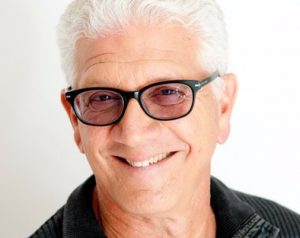

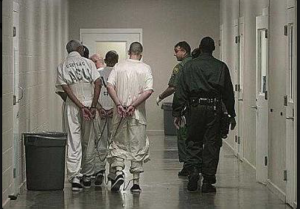
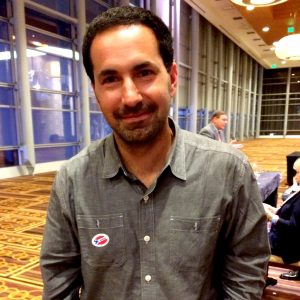
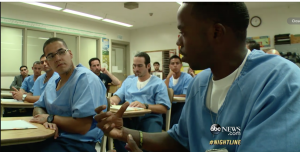
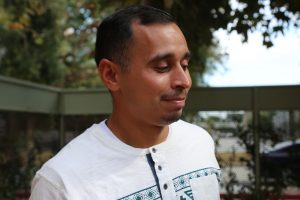
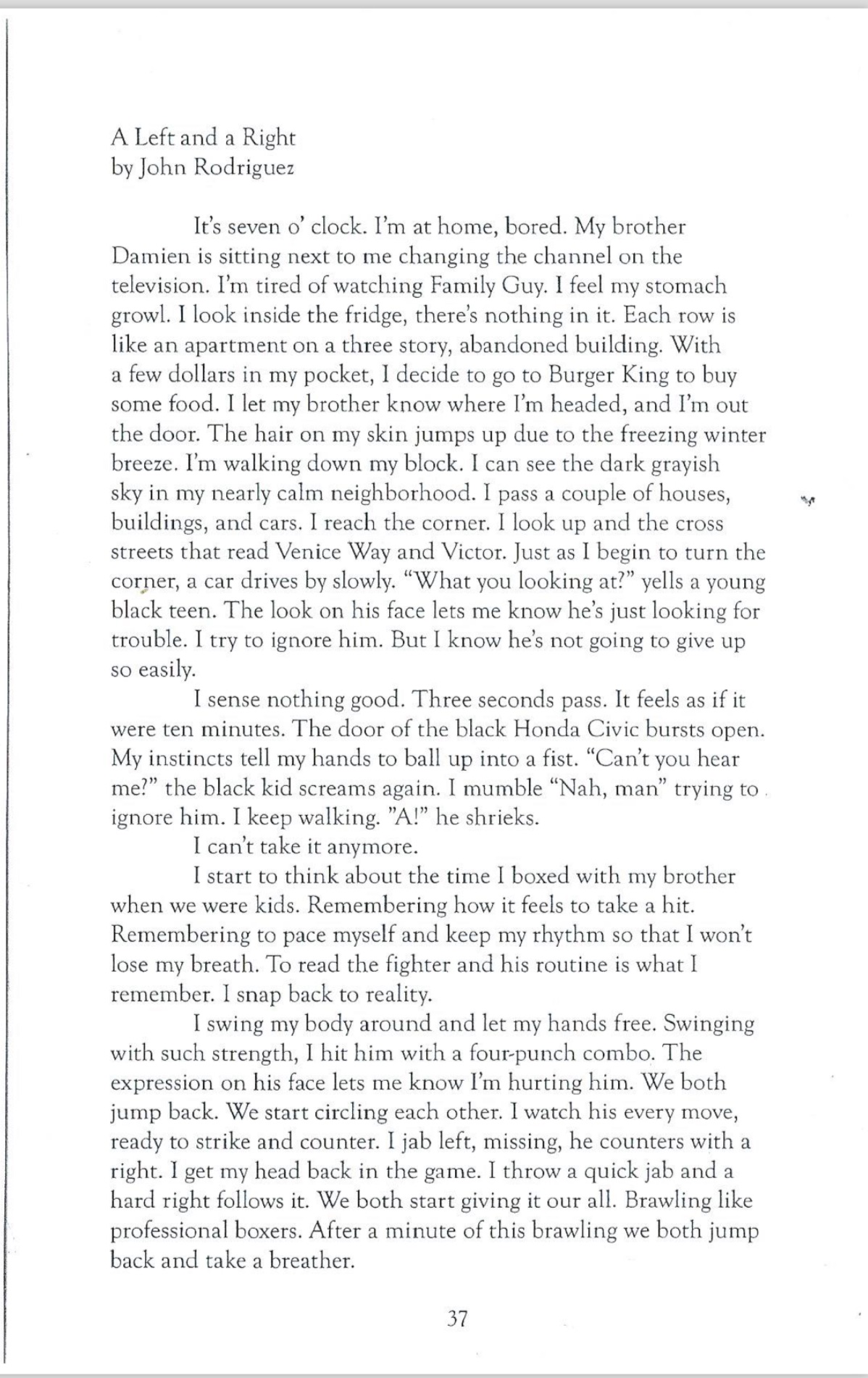
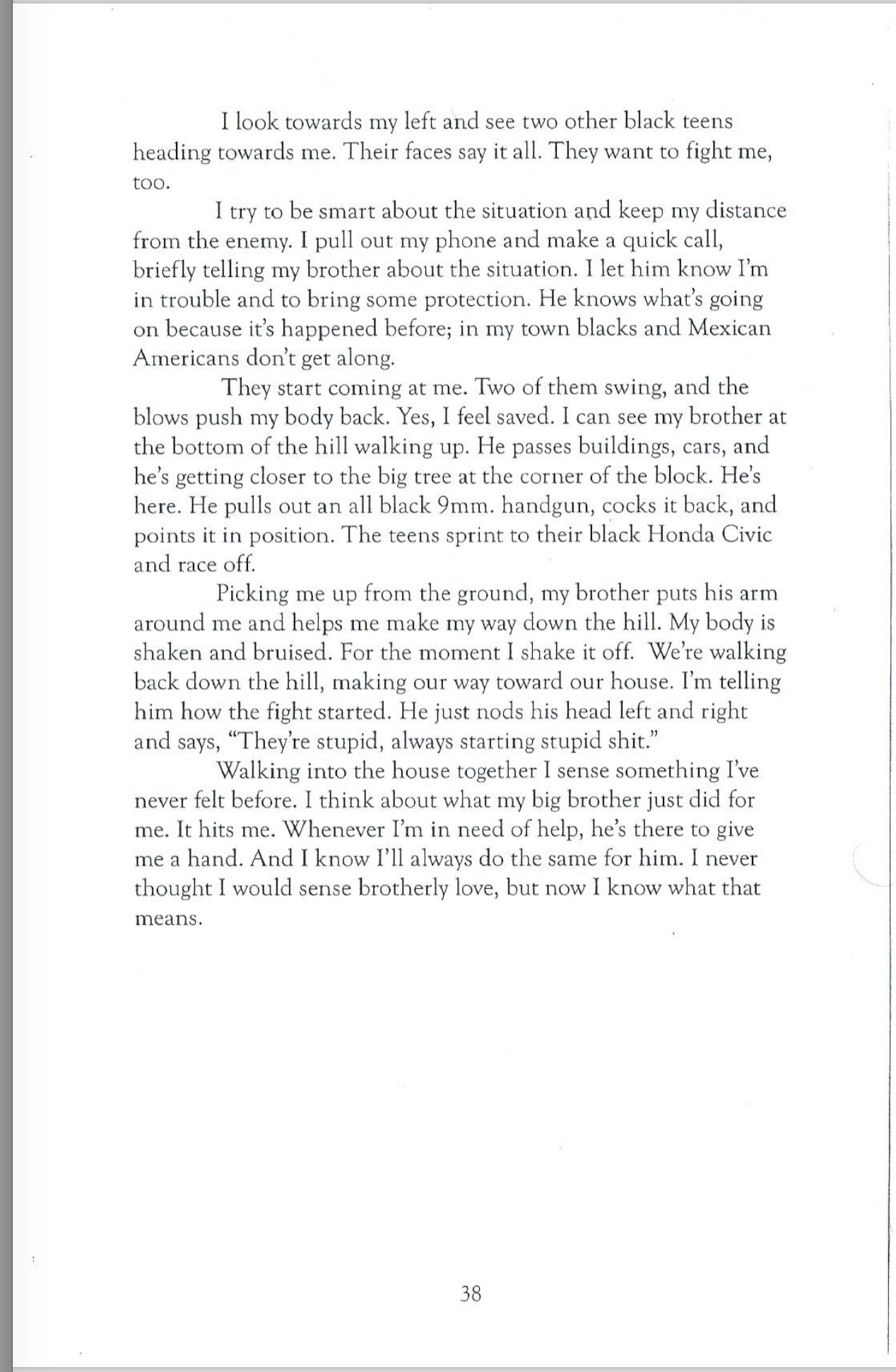
From my comment on chapter one of this exercise in feel good story telling (of the white liberal feeling the pain of the poor minority verity) “My bet is we hear an awful lot about John’s problems and a whole lotta minimizing on who he victimized” Well , one thing I’ll say for Witness La, they are predictable.
No wonder it took so long – Part 5 had a baby.